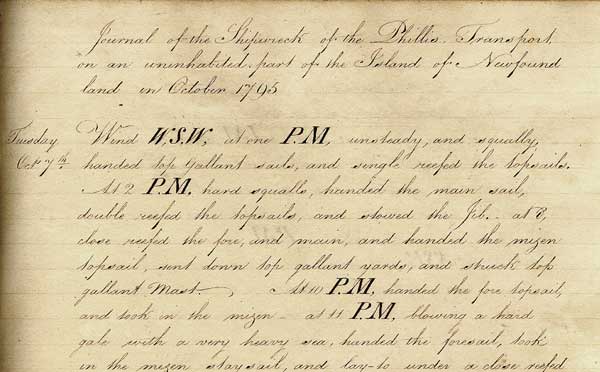Journal Provides Glimpse of Dangers at Sea
From the files of The Gazette December 11, 1997.
In October 1997, Archives and Special Collections acquired a bound, hand written manuscript from William Reese Company, New Haven, Conn. Generous financial assistance was provided by the Department of Canadian Heritage, through the Moveable Cultural Property Division of the Canadian Cultural Property Export Review Board to help repatriate this manuscript from the United States to Newfoundland. It contains 36 pages of text and is bound in dark blue cloth on paper covers with gilt lettering on the spine and the edges of the paper.

Courtesy of Archives and Special Collections (MF - 338), Queen Elizabeth II Library, Memorial University of Newfoundland, St. John's, NL.
The manuscript is a first hand account by Lieut. Howard Douglas of the Royal Artillery, a survivor of the wreck of the British ship Phillis off the southwest coast of Newfoundland in October 1795. It recounts, in harrowing detail, how the ship became caught up in a fall gale, which lasted several days and caused much death and destruction, before the ship broke apart in the rocky shoals near Little Bay Head, Cape Ray. A few of the passengers and crew managed to get ashore, but they had little in the way of food and clothing to sustain them and winter was fast approaching.
After a number of forays into the surrounding countryside proved there was no settlement nearby, the survivors soon realized their best possibility for rescue was a passing ship. They constructed a fire to be kept burning around the clock and hoisted a crude flag from a high point of land, hoping one or both would attract attention. They built a makeshift hut using wood washed ashore from the wrecked ship and made plans to spend the winter in that place. It was agreed that all would work for the common good.
The survivors had been ashore for about two weeks when a number of foreign seaman, joined by one or two others, separated from the main party. They confiscated a barrel of salted pork and a cask of wine which had washed ashore. Before the main party could organize an attack on these renegades it was rescued by a Newfoundland schooner which took the survivors down the coast to Great Jervais at the entrance to Hermitage Bay.
Howard Douglas was born in Gosport, England, on Jan. 23, 1776, the son of Sir Charles Douglas and Sarah Wood. He spent his childhood in Edinburgh with his aunt, Helena Baillie, before entering the Royal Military Academy at Woolwich, graduating on Jan. 1, 1794, with the rank of second lieutenant in the Royal Artillery.
After a tour of duty in the north of England, in the summer of 1795 Douglas was made senior officer of a detachment of troops bound for Quebec aboard the transport ship Phillis. They sailed from the port at Cowes in the Isle of Wight on Aug. 25. Six weeks later the lucky ones made it to shore on the coast of Newfoundland.
Douglas and his companions spent the winter at Great Jervais; in the spring they obtained passage to Halifax. After three months there Douglas went on to Quebec City where he spent the summer on active duty. He then spent two years in Kingston, Ont., before returning to England in 1798. In England he served in a number of military capacities and wrote and published extensively on military strategies and defences. He rose steadily through the ranks, culminating in 1821 with his appointment as major general.
On March 27, 1823, Douglas was appointed lieutenant-governor and commander in chief of New Brunswick, a position he occupied until Feb. 19, 1831. During his tenure of office, he did much to assist the development of New Brunswick: founding the University of New Brunswick; assisting the construction of a new Government House; advancing municipal and county government; re organizing the local militia; advocating education for native children in their family environment; and promoting agriculture and the construction of roads and lighthouses. He was a strong advocate of the value of the North American colonies and lobbied hard on their behalf in England during the decades following his return there in 1831. He saw free trade as a detriment to their economic development and argued for stronger, not less, tariff protection.
One place Douglas presented his ideas on the North American colonies was in the British House of Commons. After two unsuccessful attempts, he was elected MP for Liverpool in 1842 and served for five years. He continued to write and publish.
While in Quebec City, Douglas fathered a daughter, but he did not marry the child's mother. He married Anne Dundas of Edinburgh in January 1799; they were the parents of three daughters and six sons. Among the many honors he received was a knighthood bestowed in 1821. Douglas died at Tunbridge Wells, England, on Nov. 9, 1861.




